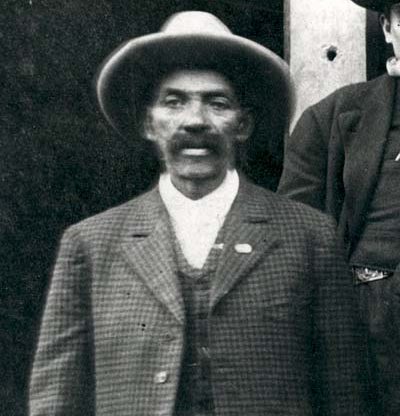Paramount+’s Western series ‘Lawmen: Bass Reeves’ ends with Bass Reeves seemingly deciding to resign from his post as a deputy marshal. Throughout the series, Bass gets conflicted about the law he is obligated to uphold and execute, especially after realizing that the rules of the land are only safeguarding the white folks. His confrontation with “Mr. Sundown” or Texas Ranger Esau Pierce further makes him question his life as a lawman. Upon getting convinced that his badge doesn’t help him deal with criminals such as Esau, he returns to his wife Jennie for good. In reality, however, Bass served as a lawman until the end of his life!
The Three-Decade Career
Bass Reeves served as a deputy marshal for thirty-two years. His career as a deputy only ended in 1907. In the series, Bass apparently decides to return his badge a few years after accepting the same from Judge Isaac Parker. In reality, Bass served as a lawman in several states, including Arkansas, Texas, and Oklahoma, mainly in the Indian territories, for more than three decades. After becoming a deputy marshal in 1875, serving the Western District of Arkansas, Bass was transferred to the Eastern District of Texas in Paris, Texas, to work there until 1897. He was then transferred to the Muskogee Federal Court to execute law in the Native Territory.

Bass was a famed lawman in Muskogee. During his tenure in the region, he arrested several criminals, and his stories were reported by newspapers extensively. Even towards the end of his career, in his late sixties, Bass hunted down several individuals. A July 1907 report that was published by the Muskogee Times-Democrat details how Bass and an officer named Grant Huddleston chased a murderer from the scene of the crime to the latter’s house to arrest him. Bass had to put an end to his life as a deputy marshal after Oklahoma became a state.
“On November 16, 1907, Bass Reeves had his picture taken with what the newspapers of the time called the ‘first federal family’ of the Western District. It was their last official act. The following day, many of the duties of the U.S. Marshal Service would be given to the municipalities and counties of the new state of Oklahoma. There was no longer a need for a large force of federal police, the men who had helped bring law and order to the territory,” historian Art T. Burton wrote in his book ‘Black Gun, Silver Star: The Life and Legend of Frontier Marshal Bass Reeves.’
Bass Reeves’ Death
Although Bass’ career as a deputy marshal ended in 1907, he continued to serve as a lawman until nearly a year before his death. After returning his deputy badge, Bass joined the Muskogee Police Department at the age of seventy. “He [Bass] is now over 70 years old and walks with a cane. A bullet in his leg, received while in the government service, gives him considerable trouble. He is as quick of the trigger, however, as in the days when gunmen were in demand,” reads a report published by the Western Age from Langston, Oklahoma Territory, at the time.

Despite joining the force, it was difficult for Bass to work due to his gradually worsening health condition. “Bass Reeves, a deputy United States Marshal in old Indian Territory for over thirty years, is very ill at his home in the Fourth ward and is not expected to live. […] Since statehood Reeves was given a place on the police force, but became ill and unable to work. For the past year, he has been growing weaker and has but little time to spend in this world,” a Muskogee Times-Democrat report published in November 1909 reads.
Bass died on January 12, 1910, at his home located on North Howard Street in Muskogee, Oklahoma, at the age of around 71/72. The cause of death was Bright’s disease, an inflammation in the kidneys which is presently known as acute or chronic nephritis, and a “complication of ailments together with old age,” as per the Muskogee Phoenix. He was survived by his second wife Winnie Reeves and several of his children, along with his mother and a sister.
Read More: Did David Oyelowo Learn Horse Riding for Lawmen Bass Reeves?


You must be logged in to post a comment.